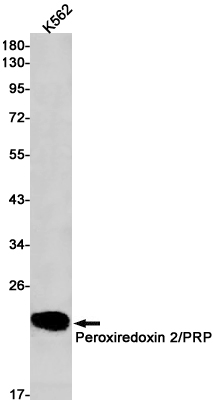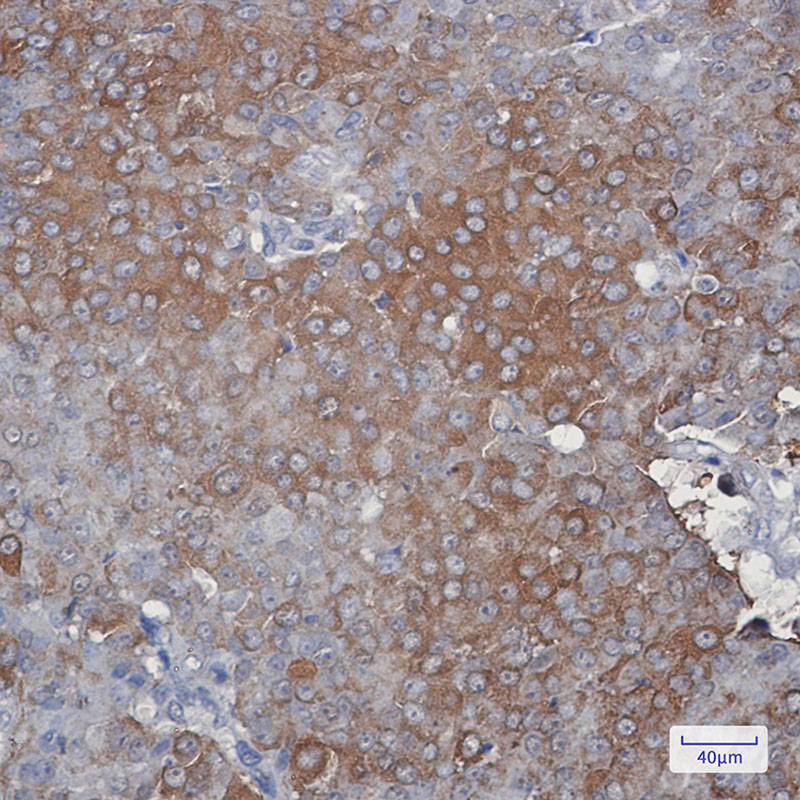

| WB | 1/500-1/1000 | Human,Mouse,Rat |
| IF | 咨询技术 | Human,Mouse,Rat |
| IHC | 1/50-1/100 | Human,Mouse,Rat |
| ICC | 技术咨询 | Human,Mouse,Rat |
| FCM | 咨询技术 | Human,Mouse,Rat |
| Elisa | 咨询技术 | Human,Mouse,Rat |
| Aliases | PRDX2; NKEFB; TDPX1; Peroxiredoxin-2; Natural killer cell-enhancing factor B; NKEF-B; PRP; Thiol-specific antioxidant protein; TSA; Thioredoxin peroxidase 1; Thioredoxin-dependent peroxide reductase 1 |
| Entrez GeneID | 7001 |
| WB Predicted band size | Calculated MW: 22 kDa; Observed MW: 22 kDa |
| Host/Isotype | Rabbit IgG |
| Antibody Type | Primary antibody |
| Storage | Store at 4°C short term. Aliquot and store at -20°C long term. Avoid freeze/thaw cycles. |
| Species Reactivity | Human,Mouse,Rat |
| Immunogen | A synthetic peptide of human Peroxiredoxin 2 |
| Formulation | Purified antibody in TBS with 0.05% sodium azide,0.05%BSA and 50% glycerol. |
+ +
以下是关于Peroxiredoxin 2(PRDX2)抗体的3篇文献示例:
1. **文献名称**:*Peroxiredoxin 2 deficiency exacerbates aging-induced oxidative stress and cognitive decline*
**作者**:Lee, Y. et al.
**摘要**:本研究利用PRDX2特异性抗体,通过免疫印迹和免疫组化技术,揭示PRDX2缺失加剧衰老小鼠脑部氧化损伤和认知功能障碍,表明其在神经保护中的关键作用。
2. **文献名称**:*Role of Peroxiredoxin 2 in colorectal cancer progression: Regulation of cell proliferation and metastasis*
**作者**:Zhang, H. et al.
**摘要**:通过PRDX2抗体检测结直肠癌组织样本,发现其高表达与肿瘤增殖和转移相关,提示PRDX2可作为潜在生物标志物和治疗靶点。
3. **文献名称**:*Peroxiredoxin 2 modulates lipopolysaccharide-induced inflammatory responses via TLR4/NF-κB signaling*
**作者**:Kim, S. et al.
**摘要**:使用PRDX2抗体进行蛋白质相互作用分析,发现PRDX2通过调控TLR4/NF-κB通路抑制炎症反应,为抗炎治疗提供新机制。
以上文献均通过PRDX2抗体验证目标蛋白的表达或功能,涉及神经退行、肿瘤及炎症等领域。具体信息建议通过PubMed或Google Scholar检索标题获取全文。
Peroxiredoxin 2 (PRDX2) is a member of the peroxiredoxin family of antioxidant enzymes that play a critical role in cellular redox homeostasis by scavenging reactive oxygen species (ROS), such as hydrogen peroxide. It is ubiquitously expressed in various tissues, particularly in erythrocytes, where it protects against oxidative damage to hemoglobin and cell membranes. PRDX2 also participates in diverse cellular processes, including cell proliferation, apoptosis, inflammation, and signal transduction, with implications in cancer, neurodegenerative diseases, and aging.
Antibodies targeting PRDX2 are essential tools for studying its expression, localization, and functional mechanisms. They are widely used in techniques like Western blotting, immunohistochemistry (IHC), and immunofluorescence (IF) to quantify PRDX2 levels in disease models or assess its subcellular distribution. Researchers utilize these antibodies to explore PRDX2's role in oxidative stress responses, its interaction with signaling pathways (e.g., NF-κB), and its potential as a biomarker for conditions like cancer or cardiovascular disorders.
PRDX2 antibodies are typically raised against specific epitopes of the human or murine protein, with monoclonal and polyclonal variants available. Validation includes testing for specificity via knockout cell lines or tissues and verifying cross-reactivity across species. High-quality antibodies ensure reliable detection of both reduced and oxidized forms of PRDX2. which is crucial given its dynamic redox-sensitive conformational changes. Proper antibody selection and validation remain critical for accurate experimental outcomes in redox biology studies.
×